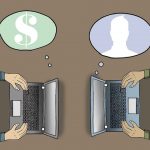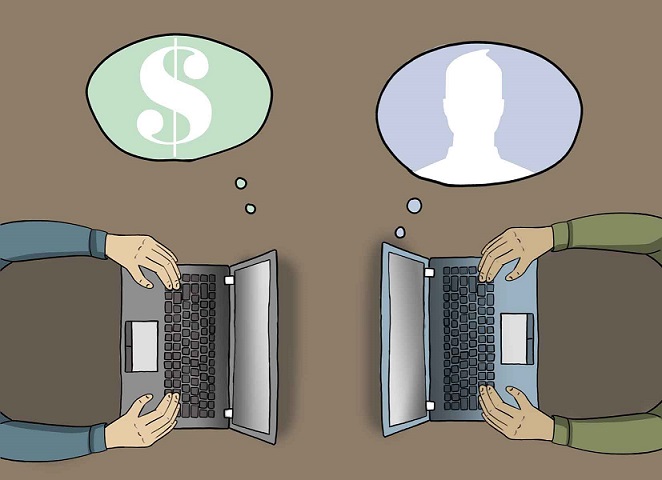Your online identity is up for grabs
Is your Facebook page your intellectual property? Do you browse the internet with careless bliss while taking BuzzFeed quizzes and shopping on Amazon? If you do, you’re one of thousands. But here’s the thing, you don’t own anything — not your search history or what you post, and certainly not what you look at — even if you’re in private mode. Oh if it were only that easy.
With every “I agree” box we click, we accept to have our information looked at, analyzed and shared amongst other companies. However, large internet companies essentially control the internet — long gone are the days where a digital democracy in which everyone has equal status and say online was a viable option.
Dr. Alexandra Nutter Smith, a popular lecturer in the Interdisciplinary Arts and Sciences at the University of Washington Tacoma had some great insight to just how our online identity is dealt with and how copyright laws have changed over the years, from protection to litigation.
Nutter Smith described “the details that you put into your profile status, updates, everything … things like check ins” to be up for grabs for the website you’re using. Most people are all too aware of this cringe-worthy “I’m being watched” feeling that comes with obvious surveillance. However, it usually goes away once you start online shopping, at least for me it does — Amazon can solve many woes.
Yet, what most people don’t realize — or try very hard not to realize due to the creepiness factor — is that the obvious ways websites track you is only the tip of a gnarly iceberg. Nutter Smith says there are much more invisible ways to track. This usually consists of interaction between websites.
This interaction works something like this: they’re ganging up on you to sell you those sunglasses you know you really don’t need. The tracking mechanism knows you’ve been looking at Ray Bans for an inordinate amount of time, so it then advertises them on a completely unrelated — or so you thought — site. As Nutter Smith explained the process, “if you use two sites that happen to use the same tracker, they’re able to triangulate that data so it’s not just personal information, its behavioral information as well.”
So while online companies don’t know personal things like what you look like or what your doing in your free time (as long as it’s offline), they can still paint a pretty large picture about you. Facts like what you shop for online, how many times you tagged your bestie in that slow blink meme, and what kind of bars you frequent on Saturday nights are all privy to some dude trying to sell you not only physical items, but also social media platforms, web tools and basically any other type of website. Business sites are all trying to get traffic, so they could also just be trying to sell you the idea of using their website instead of any others.
The “Web 2.0” movement, allows for more interaction between user and creator, as well as blurring the line between them. Users are creators now. While, it has added to the online experience, it has also allowed for monetization of our online activity.
On this topic, Nutter Smith commented, “The technology develops hand in hand. No one is developing technology magnanimously, like out of the goodness of their heart.” At the end of the day the company wants to make money, not advance technology for advancements sake. We can see this specifically in the plans for a Google car that drives itself. Google doesn’t really care about advancement for advancement’s sake; they want to allow people more time to be on the computer — and using Google — while riding home.
How can we protect ourselves? “In the opinion of a lot of digital activists, it shouldn’t be our job,” said Nutter Smith. Laws would need to change to truly protect people online. However, until then, we can set up “do not track” lists and do our best to retain our personal information with the tools set forth by other digital activists. Nutter Smith said that this issue, like many others, requires a “structural change and it’s hard to imagine a model in which our privacy would be protected.”
Copyright
“Originally, like 100 years ago, copyright laws were passed in the U.S. to foster artistic expression,” said Nutter Smith. Before this, there was no incentive for novelists or artists to make their work — anyone could copy it. Copyright was introduced to protect artists from this and ensure that they could make some kind of living off of their artistic passions.
However, as the layers of business grow and “there becomes more levels for people to make money, the pursuit of copyright violations becomes increasingly aggressive or predatory” mentions Nutter Smith. This is why copyright is now hand-in-hand with litigation.
This is of vital importance for anyone online. Nutter Smith believes “it’s unfortunate that your average internet user would have to essentially protect themselves from the predatory information gathering behavior of ” internet service providers. However, until there is a systematic change, this is where we are.
“We get news that seems to be free, we get ways to communicate with people that seem to be free entertainment, and so I feel like the more people know about it the more uneasy we get,” says Nutter Smith. While these things seem free, companies often take our information — all the while we are often being marketed to.
For more information on protecting your online identity, Electronic Frontier Foundation has very understandable information, as does Do Not Track which provides a personalized approach to protecting yourself online.







